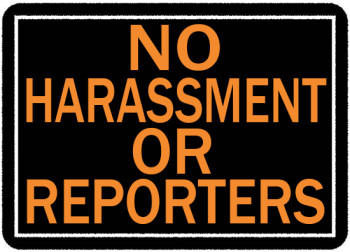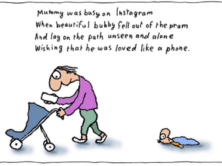
iMediaEthics illustration
The UK Sun harassed a sexual assault victim, UK regulatory body the Press Complaints Commission ruled.
The victim, whose name is obviously not identified by the PCC, testified for the prosecution about the assault by Max Clifford. Clifford, a publicist and now convict, was sentenced to eight years in jail in May “for a string of indecent assaults against girls and young women,” the BBC reported.
Sun managing editor Stig Abell told iMediaEthics by e-mail: “While we do not believe that our conduct (over a period of more than a year, in which we only spoke to the complainant once) amounted to harassment, we respect the PCC’s right to reach an independent decision and have published it prominently. We regret that we caused the complainant any distress.”
The Sun tried to interview the woman four times between April 2013 and March 2014 even though she asked them to leave her alone, the PCC’s report read.
The PCC noted that it is very important to “[protect] vulnerable individuals from unwanted and intrusive press contacts.”
A police officer even told the Sun reporter to go away, according to the PCC. The officer was at her house when the reporter showed up in February of this year and told the reporter “she did not wish to speak to [the newspaper] at any time,” the PCC wrote.
The Sun denied it harassed the woman and claimed the reporter was just trying to get a comment. It also claimed the woman didn’t clearly tell them to leave her alone. Specifically, the Sun gave the following excuses for why it kept coming back each of the times:
1) The reporter thought he went to the wrong address the first time (iMediaEthics notes that excuse is questionable because the newspaper’s reporter continued to go back to the same house two more times and called the same house.) The reporter spoke with a friend of the woman’s that time.
2) The reporter said the woman’s husband only said she wouldn’t talk until after the case against Clifford was over.
3) The reporter said he didn’t know the police officer was a police officer and that even though the woman said she identified herself as well, the Sun didn’t know she was the person they wanted to talk to.
“The newspaper maintained that it was only on the final approach that a reporter knowingly spoke to the complainant,” the PCC wrote.
Apparently, by the Sun‘s logic, if everyone from a friend to the police to the husband of the person you want to speak to tells you to go away, it doesn’t count.
Further, the paper argued it was OK to keep going back because the woman might have changed her mind and decided to comment after all.
Interestingly, the PCC agreed that it was OK for the Sun reporters to try to contact the woman the first two times because “no desist request had been made during the first approach,” and during the second contact, the woman’s husband indicated his wife might talk to the paper after the trial.
However, the Sun shouldn’t have gone back the fourth time because the third time the reporter contacted the woman, he was told not to come back, according to the ruling. The PCC wrote:
“There was some dispute about the third approach, including about whether the complainant had identified herself. The newspaper had accepted, however, that the reporter had been told not to ‘show his face’ again. The Commission was satisfied that this was a clear request to desist. Although the policeman had not identified himself, there were no substantive grounds for the reporter to doubt that he was representing the complainant.”
The PCC said it definitely wasn’t OK for the Sun to contact the woman the fourth time and dismissed the excuse that maybe she would change her mind.
“While individuals do sometimes change their minds about speaking to the press, this could not justify persistence in this context, particularly given the complainant’s vulnerable position,” the PCC wrote.
Further, the PCC noted that the woman’s decision to be interviewed by another outlet doesn’t negate her request for the Sun to leave her be. “While the complainant had later spoken to another newspaper, this did not affect the validity of the request – to the contrary, it bore out her husband’s prediction that she would not comment until after the verdict,” the PCC decided.
As required, The Sun published the PCC adjudication on both its website and in its print edition.
CORRECTION - August 17, 2014 12:18 PM
Updated headline to clarify that UK Sun did go to victim’s home four times, but the “the first time, there was no contact; in the second, her husband said she was likely to speak later,” Sun managing editor Stig Abell told iMediaEthics by e-mail. We regret the error.





